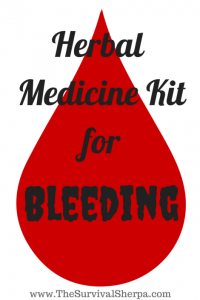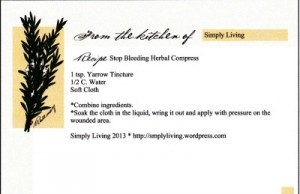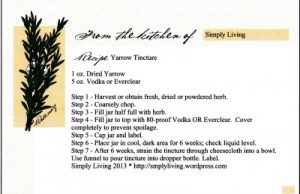By Kat Yorba
Today we continue on with our series with looking at “Bleeding.” We will discuss the herb Agrimony and Yarrow. Make an Herbal Compress to stop Bleeding and a Tincture of Yarrow.
BLEEDING
Some people can handle the sight of blood, some can’t. I am one of those who can’t. But I find that being prepared…knowing ahead of time what to do and having my supplies on hand enables me to feel better about the whole issue.
Let’s better understand what bleeding does. Bleeding has it’s advantages. It’s the bodies way of cleaning dire and foreign particles from a wound, and when exposed to air it forms a fibrous substance called fibrin. This fiber creates a netting that entangles other blood cells so that they clot into a scab…your bodies natural band-aid!
So, you’re in a serious situation and bleeding needs to be stopped right away. Certain herbs can be applied directly to the wounded area. If this does not stop the bleeding, apply an herbal compress with pressure. While administering herbal remedies, you should also try to slow the flow of blood by raising the injured area higher than the heart.
Agrimony, plantain and yarrow are versatile herbs that can arrest bleeding and encourage scabbing.
Keep in mind that treatments made with these herbs in the form of powders or poultices are an emergency tactic only. Although herbs quickly arrest bleeding, they are not antiseptic enough so proper cleaning and disinfecting will also need to be done. Use your discretion but seek medical attention when necessary!
Herbal Compress to Stop Bleeding
Agrimony
Defined
Agrimonia gryposepala: species native to North America commonly known as tall hairy agrimony was used by the Among the Iroquois people, Cherokee, The Ojibwe and other ingenious peoples for much the same purposes of the common agrimony Agrimonia eupatoria which was naturalized from Europe. Hemp Agrimony, Eupatorium Cannabinum(Linn.)and the Water Agrimony Eupatorium Aquaticum mas, have somewhat similar properties but are not botanically related.
Therapeutic Uses
Agrimony’s astringency is effective against diarrhea, especially in small children, and because of its low toxicity, the herb is particularly suitable for children’s illnesses. Agrimony stops irritation of the urinary tract that may increase a child’s urge to urinate and, therefore, may be useful in the treatment of bladder leakage (cannot hold urine), bed-wetting and adult incontinence.
Agrimony is perhaps best known as a wound herb used on medieval battlefields to staunch bleeding. This same property helps to staunch heavy menstrual bleeding as well. Agrimony is most used in modern herbal practice as a mild astringent and a tonic, the tannins it contains tone the mucus membranes making it is useful for alleviating the symptoms of coughs and sore throats. The combination of being a bitter tonic as well as an astringent herb make agrimony a valuable tonic for the digestive system and a useful remedy for healing peptic ulcers. The bitter principles in the plant support the function of the liver and gallbladder. The herbal tea can be used as a skin wash; it is thought to improve minor injuries and chronic skin conditions.
Recipe
Skin Wash/Tea/Infused Liquid for Creams or Gargle :
Standard brew using 1 teaspoon of dried herb to each cup hot water. The longer you let it steep, the more tannins are extracted. Make a stronger decoction for external use in baths and skin washes Drink 2 to 3 cups per day. Used in ointment form for skin rashes, and as a gargle for sore throat.
Yarrow
Description:
Yarrow was once known as “nosebleed”, it’s feathery leaves making an ideal astringent swab to encourage clotting. Yarrow skin washes and leaf poultices can staunch bleeding and help to disinfect cuts and scrapes; taken as a tea it can help slow heavy menstrual bleeding as well. Yarrow is a good herb to have on hand to treat winter colds and flu; a hot cup of yarrow tea makes you sweat and helps the body expel toxins while reducing fever. The chemical makeup of yarrow is complex, and it contains many active medicinal compounds in addition to the tannins and volatile oil azulene. These compounds are anti-inflammatory, antibacterial, and help relax blood vessels. Yarrow should be on everyone’s list of remedies since the herb makes itself useful for everything from brewing beer to a hair rinse to preventing baldness. In China, yarrow is used fresh as a poultice for healing wounds. A decoction of the whole plant is prescribed for stomach ulcers, amenorrhoea, and abscesses.
Side Effects:
Avoid in pregnancy, can cause allergic skin reactions in sensitive people who suffer from allergies related to the Asteraceae family. Moderation is the key to safe use, the thujone content can be toxic over an extended period of time
Recipe:
Yarrow Spritzer
For a tonic that soothes the nerves and uplifts at the same time, this is a good combination for an aroma lamp or mister. Also use as a facial steam for the benefits of yarrow that is skin healing and for spruce that helps the respiratory system.
Variations: Use lime instead of orange.
3 drops-Orange
4 drops-Spruce
2 drops -Ylang-Ylang
6 drops -Yarrow
How to Use:
Lamps/Diffusers:
15 to 20 drops of a blend can be used at a time in most standard sized aroma lamps.
Mist Spray:
As a general rule use 15-30 drops per cup (8 oz.) of liquid for mist sprays, depending on your preference and the strength of the essential oils.
Yarrow Tincture
Recap: That concludes our look at “Bleeding”. Today we learned a little more about the herbs; Agrimony & Yarrow. We made a Herbal Compress to stop Bleeding and also Yarrow Tincture.
Looking ahead: Next post we will be learning all about “Bruises”. We will first talk about Arnica, Witch Hazel and Chamomile. Then move on to several recipes; Bruise Compress, Tincture of Arnica & a Herbal Ice.
Reminder: Have on hand St. John’s wort flower tops, Witch Hazel Bark, Chamomile Flowers, Lavender Flowers, Lavender Essential Oil, Distilled Water, Washcloth for Compress.
About Kat Yorba: Hi, I’m Kat. I’m a wife, mother, friend, massage therapist, writer, gardener, and child of God. I LOVE coffee, chocolate, essential oils, good books, cats, motorcycles, guns, drag racing and living in the USA! Learning to be more self-reliant & self-sufficient in a semi-homemade, homesteading way! Connect with Kat on her blog, Simply Living Simply, Facebook, Twitter, Pinterest, and Google+.





